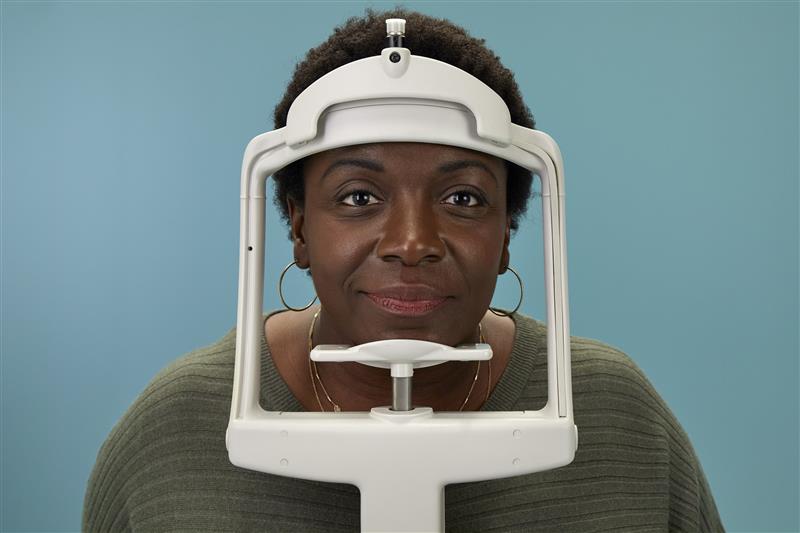
Digital Diagnostics’ webinar, “Building Bridges in Eye Care: How SSM Health Connected Primary Care and Ophthalmology”
Featuring Dr. Joseph Eckelkamp, Medical Director of Population Health and Urgent Care at SSM Health, and Katherine Fairchild, Director of Artificial Intelligence and Machine Learning at Digital Diagnostics, the webinar discussion focused on how SSM Health is leveraging AI to modernize diabetic retinopathy testing and improve patient outcomes. Dr. Eckelkamp specifically highlighted how SSM Health has generated quantifiable results, increased testing rates, and improved collaboration with ophthalmologists – all through the selection, implementation, and successful EHR integration of innovative AI-powered, LumineticsCore®.
The Challenge: Gaps in Diabetes-Related Eye Exam Completion
The traditional eye exam for diabetes (EED) presents significant challenges not only for patients but also for healthcare providers. During the webinar, Dr. Eckelkamp outlined the primary challenges his team faced with traditional diabetic retinopathy testing:
- Low Compliance Rates: Nearly half of patients with diabetes do not complete their annual eye exams, increasing the risk of preventable vision loss.
- Fragmented Care: Fax-based referrals and siloed specialist care often lead to missed follow-ups and disconnected care teams.
- Patient Barriers: Limited transportation, scheduling challenges, and lack of awareness of vision tests are frequent roadblocks.
SSM Health is not alone; these are common issues nationwide. Every year over 60,000 people go blind from diabetic retinopathy, a complication of diabetes that can be prevented if diagnosed in the early stages. Yet, despite guidelines recommending annual exams, up to 85% of people with diabetes don’t receive them, often because the traditional care model is inconvenient or hard to access.
Considering these realities, Dr. Eckelkamp and his team knew SSM Health needed a more scalable, team-based solution.
The Solution: Choosing and Implementing LumineticsCore
In May 2023, SSM Health implemented LumineticsCore, Digital Diagnostics’ FDA-cleared autonomous AI diagnostic platform for diabetic retinopathy. The organization chose LumineticsCore because of its ability to provide real-time diagnostic results at the point-of-care, with no specialist overread required. Dr. Eckelkamp emphasized the value of choosing a solution that works within SSM Health’s primary care workflow, integrates seamlessly into their EHR, and can be operated by a broad range of staff.
By reducing the need for specialist appointments and decreasing the likelihood of delayed results, LumineticsCore allowed SSM Health to remove key access barriers and reach patients who might otherwise fall through the cracks.
Today, LumineticsCore is being used in clinics across the SSM Health system, bringing diagnostic testing directly into the hands of primary care teams.
Real-World Impact
Dr. Eckelkamp shared compelling outcomes from SSM Health’s implementation of LumineticsCore. Within the first year of using LumineticsCore, the number of eye exams for diabetes performed increased by nearly 70 times. To date, SSM Health has completed over 11,000 exams, identifying diabetic retinopathy in 21% of those patients. Furthermore, SSM Health has improved eye exam for diabetes quality measure compliance rates year-over-year.
What Other Health Systems Can Learn
Dr. Eckelkamp offered thoughtful advice for other organizations considering AI-based tools:
- Begin by asking, “How can we close care gaps in a way that empowers existing care teams?”
- Choose a platform that fits your current infrastructure and meets your patients where they are.
- Recognize that AI doesn’t replace providers. Instead, it extends their capabilities.
- Prioritize solutions with strong implementation support to ensure long-term success.
- Build trust by selecting tools that are simple to explain, easy to use, and patient friendly.
SSM Health’s experience highlights what’s possible when AI is thoughtfully integrated into existing clinical workflows. Their success offers a valuable example for other health systems looking to improve diabetic retinopathy testing and close critical care gaps.
If you’re interested in learning more about LumineticsCore, book a demo here.